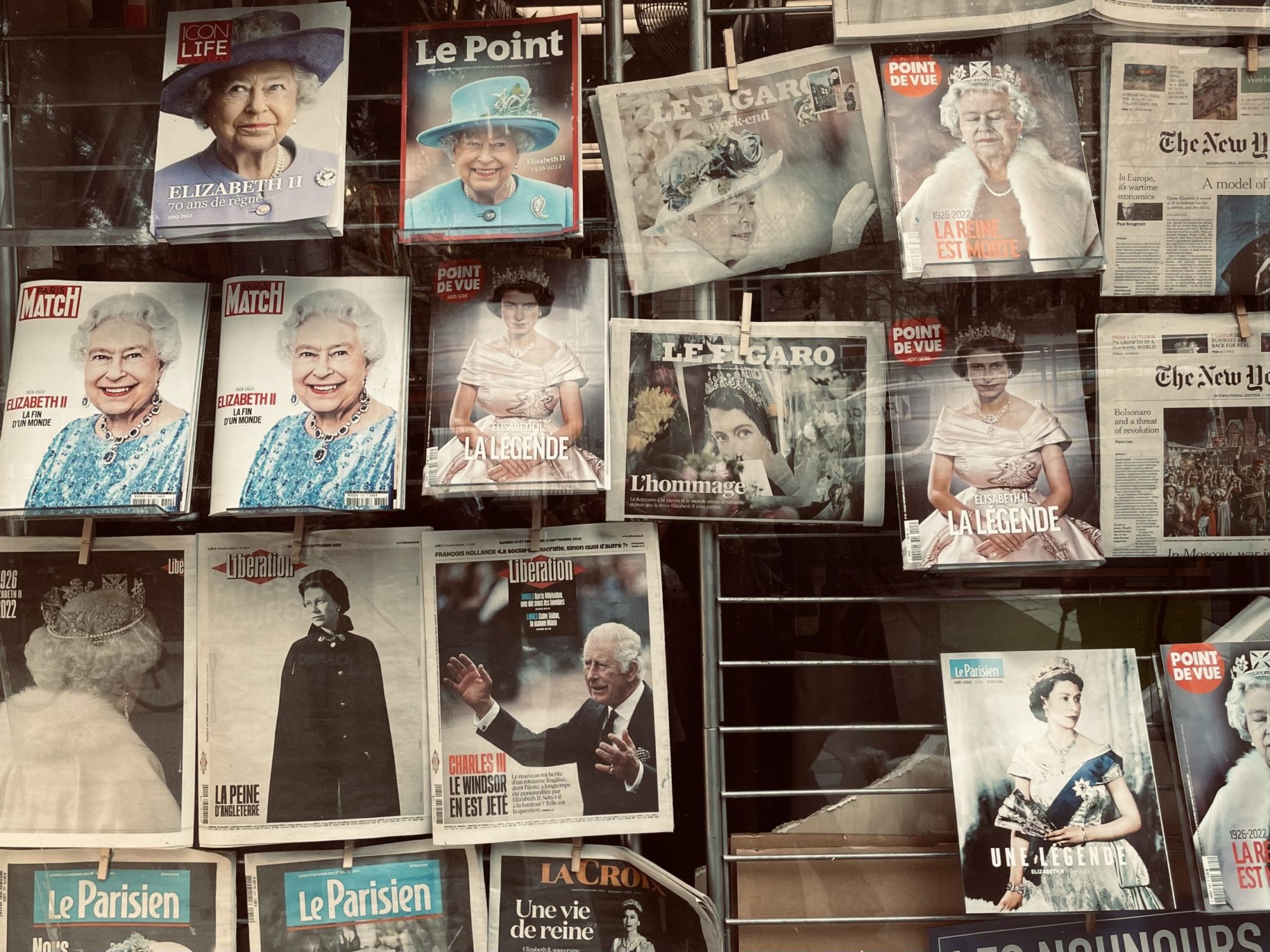Before the announcement of the death of Queen Elizabeth, I, like many journalists, kind of knew. Once, as an aspiring journalist, I’d read that if the Queen died, the BBC would turn black from its signature red. I came across this information again in an explainer video by Business Insider that trended on Twitter hours before the Queen’s death was announced. About two hours before the news broke, I checked the BBC’s website, and it was black. I had the type of elation a journalist gets when they stumble on an unlikely link.
I took a screenshot of BBC’s black logo and shared it in Journo-Geekology, a Whatsapp group of journalism and media geeks that I belong to.
On my WhatsApp status, I joked about taking a moment of silence for the dead Queen, and an hour of silence for history students across universities who will now be studying the Elizabethan era as a part of their curriculum. On the next slide, I joked about me and my freelance journalist friends not getting commissions because the Queen’s death would take over the media space for the next couple of weeks. My circle of freelance friends screenshot and reposted this slide. A friend posted “Operation London Bridge to commence. Shelve your pitches or schedule it for October ending (skull face emoji).” All of this took place more than an hour before the Queen’s death was officially announced on Twitter.
To me and my friends — journalists and citizens — Elizabeth’s death was just another trend the media would be shoving down our throats in the coming weeks. It was like coverage of record-breaking heatwaves in the global north or the tension between the United States and China over Taiwan — we did not care that much. We were literate enough to know that these phenomena are cogs in the wheels of larger issues that affect us, but there are more pressing wahalas at hand.
The death of the Queen, for me as a young Nigerian, is met with numbness. The Queen is dead, so what?
AN EMOTIONAL DISCONNECT, OR IS THIS GENERATIONAL HEALING?
I knew the Queen through the little national history I was taught in social studies classes as a child. Much of this history, as I would later learn, is either whitewashed or oversimplified. As an adult who’s tried to learn about my country’s history, I am deeply aware that Elizabeth was part, if not center, of Britain’s involvement with Nigeria. Her roles are complex, but no matter how much you search, the Queen’s good deeds and perceived “helplessness” do not justify the evils she condoned and benefitted from. I am deeply aware of these facts but found it hard to feel anything over the Queen’s death. I could connect with expressed anger and found the incessant cries of “respect the dead/old” by British Imperialists to be quite annoying, but anger? No. When I spoke about the Queen’s legacy in Africa, it came from a place of intellectual effort. There was an emotional disconnect.
My maternal grandmother knows the Queen as the distant commanding figure of oppressive and racist white soldiers who thought Nigerians to be inferior. As a kid, her elders told her stories about Indigenes being beaten or raped by white soldiers. These abuses, she heard, happened and hung around almost every month, like the moon’s halo. My paternal grandfather, a moderately-traveled businessman and religious leader recognizes the Queen as the head of a powerful kingdom that grew off the resources of its colonies. My parents inherited their fractions of these feelings. My mother’s anger for Britain is unclear, muddled by her peaceful being and the dream that her children would one day emigrate to the United Kingdom, where things are better. My father, also a moderately-traveled businessman, says Queen Elizabeth does not recognize the things Britain did to its colonies as evil.
I did not crouch by firesides and prayer mats to hear stories of colonialism from my parents. My parents spent their teenage years amidst Nigeria’s many coups and political instability, the stories their parents told them enabled them to draw a line between Britain’s involvement and the situation Nigeria was in at that moment, but they made sure their children did not inherit that emotional burden. Is this what it means to move on? Is this what generational healing looks like? The same is true for my friends, we did not inherit the emotions of our parents and grandparents.
When I spoke about the Queen’s legacy in Africa, it came from a place of intellectual effort. There was an emotional disconnect.
I have more pressing issues that do not allow me the luxury of feeling anything over the Queen’s death. Emotionally, it’s a meh. Although, I laugh at memes, banters, and dramatic reactions to her death. These things have provided some comedic relief as I worry about more pressing issues. Even then, humor derived from the Queen’s death is not much to write about. I find the death of Alaafin of Oyo more amusing. Unlike the Queen, the King of Oyo was called the child of death, whom death could not kill. Alaafin’s immortality was touted so much that the line between exaggeration and occultic belief blurred.
The humor toward the Queen’s death is independent of her roles in British colonial and neocolonial actions. I find it perfectly natural to joke about the passing of a 96-year-old monarch whose death means the unraveling and reassessment of so many cultural and political norms because marginalized people have always bantered. Nigerians laugh because we must not cry. We banter over our marginalization, our corrupt and incompetent leaders, our failing economy, and about our favorite music artists committing atrocities.
Knowledge is not readily available. Nigeria cannot face even the whitewashed and oversimplified version of its colonial and post-colonial history. In 2009, the government removed history from the education curriculum, citing apathy toward the subject. Today, many Nigerians are entirely unaware and unconnected to the roles Britain played during colonial and post-colonial times. The realization that Nigeria would not exist as a country without the British amalgamation and naming is lost on many.
MADE TO CARE
In moments and days after the Queen’s death, amidst efforts to silence these views, I shared screenshots from tweets and articles that interrogated the Queen’s controversial legacy in Africa. I shared Uju Anya’s interview on the Cut, making sure to provide a backstory about her controversial tweet. I shared views from Irish and Indian Twitter, places where the sourness about the Queen’s legacy is a bit more mainstream. In Ireland, the Queen’s death sparked conversations about Irish oppression under Britain and the Potato Famine. As reported by Know Your Meme, “many Irish internet users humorously celebrated her passing by chanting “Lizzy’s in a box” at a football match in Dublin, dancing to Queen’s “Another One Bites The Dust” on TikTok or listening to Crab Rave. In India, her death spurred emotions concerning Britain’s colonial legacy in the country. I also shared Alexander Onukwe’s article, making sure to highlight the sentence; “what does Britain owe Africa and when will it pay in full?” I posted all these on my WhatsApp and deleted anything suspicious I had retweeted during the heat, knowing fully that it could affect my employability.
As a journalist, you build a weird relationship with how people react to your work and perspectives. You learn that it is important feedback, but you also have to build a sort of protection against negative views. As I posted these articles, many people who had only learned about the Queen from contemporary media coverage and the Netflix show, “The Crown,” engaged me, advising me to “rest,” or to stop promoting the barrage of young people hating over a dead old woman on social media.
After sharing and reading various works over the Queen’s death on Journo-Geekology, we decided to have an official discussion about her role in British involvement in Africa. It was hard to gather interest. The Queen’s death was important, but it did not spur enough emotion to be worth discussing. Emotionally, the Queen’s death was sub-par to a well-written story which we often did not hesitate before discussing in the group.
If we had opted to discuss the meaning of the Queen’s death for African freelance journalists working for international media, perhaps there’d have been a better reception.
International media has its way of forcing the West’s problems and feelings down the throats of others. African journalists, especially those who work for international media, learn this early. They know that free speech only exists when it fits the Western perspective. They know fair coverage does not apply to everyone. They know that non-western stories are complimentary coverage that is cut off anytime more “pressing” issues come up. And especially if that coverage antagonizes the western narrative.
MORE PRESSING ISSUES
Since the Queen’s death, many African leaders — who themselves witnessed Britain at its most brutal moments — have shared condolences over the Queen’s death.
To be honest, I do not care. Elizabeth’s death is lost on me. Beyond worries that I will not be getting commissioned soon, my educational life is in limbo over a strike by the academic staff union that has lasted seven months. This strike was embarked on Feb. 14, 2022, barely 14 months after another 9-month strike was called off in late 2020. My country is wobbling over rising insecurity, eye-wobbling corruption, and political instability led by the same politicians who ruled during the country’s early post-colonial times. I know that Britain’s involvement with Nigeria — which the now dead Queen actively participated in and benefitted from — is a key reason for many of the problems Nigeria faces today, but I am too occupied by these problems to feel much about the Queen.
Queen Elizabeth II is dead, so fucking what? For me, the politics she leaves behind is sour, and the amusement, inferior.














